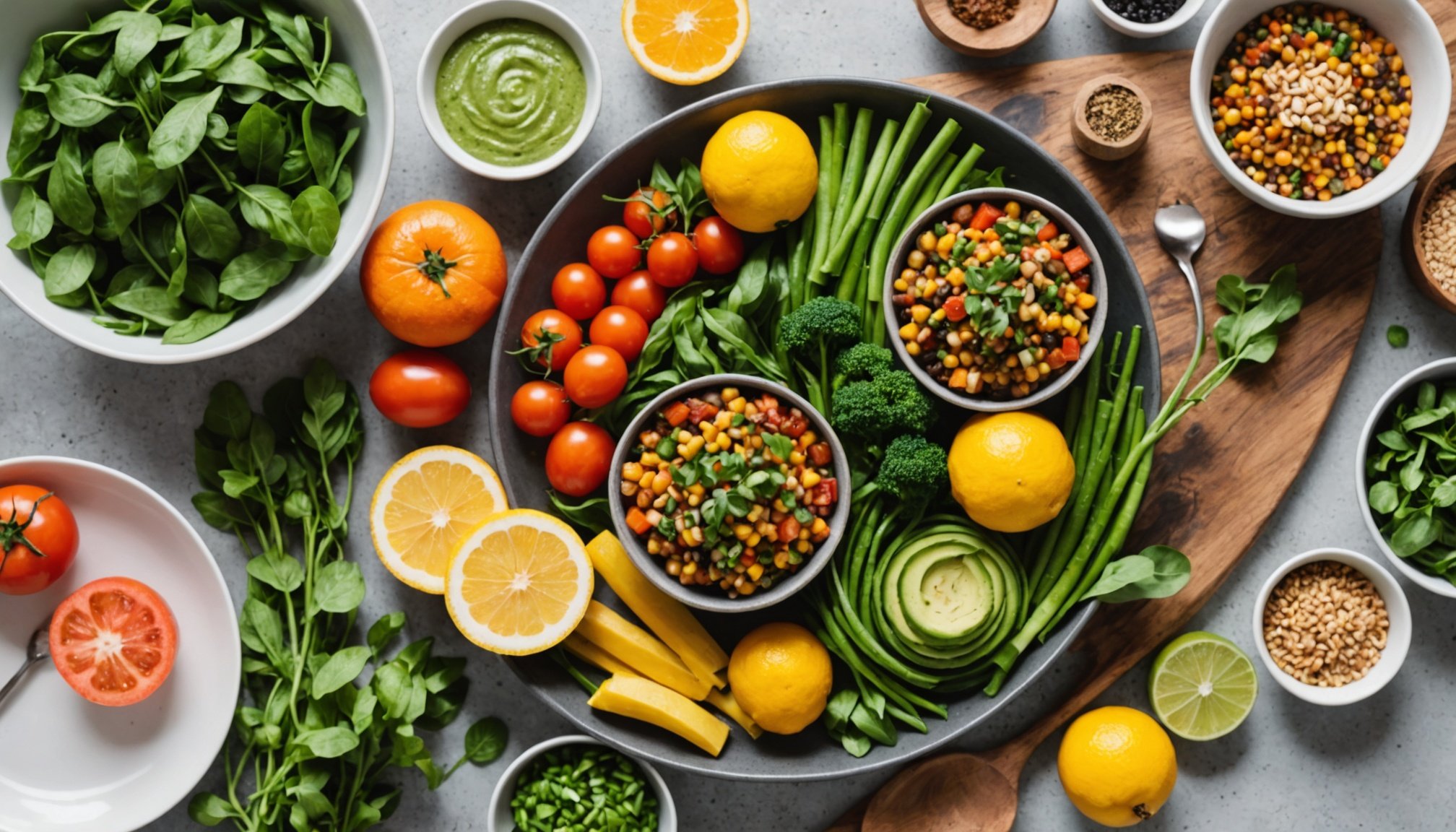Understanding Plant-Based Nutrition
Exploring the world of plant-based nutrition can open doors to a healthier and more balanced lifestyle. Essential nutrients commonly found in a plant-based diet include vitamins, minerals, fibre, and antioxidants, which are vital for maintaining overall wellness. These nutrients support bodily functions and help in disease prevention.
A key component of plant-based nutrition is the diversity of food sources. Leafy greens, fruits, nuts, seeds, and legumes offer a wide range of nutrients contributing to a balanced meal. For instance, leafy greens provide calcium and iron, while legumes are rich in protein. Including a variety of these foods ensures a comprehensive intake of necessary nutrients.
In parallel : Navigating the benefits and challenges of ai in senior healthcare: essential insights for a transformative future
Adopting a plant-based diet can bring numerous health benefits. Research indicates that such a diet can lower the risk of chronic diseases, such as heart disease, diabetes, and certain cancers. Additionally, these diets are linked to improved digestion and weight management, due to their high fibre content.
However, it is crucial to focus on balanced meals within a plant-based lifestyle. Ensuring your diet includes diverse food groups can optimise nutrient intake and promote overall wellness. Incorporating a mix of plant foods helps in achieving the delicate balance of energy and nutrients necessary for a healthy life.
Also to discover : Discover the hidden benefits of intermittent fasting for optimal brain health
Meal Planning for Beginners
Meal planning is a straightforward yet transformative practice that helps simplify your weekly meal prep. To start, follow a few basic steps: First, decide on a weekly menu by choosing recipes that feature plant-based ingredients. This keeps your meals nutritious and budget-friendly.
Begin by listing your favourite plant-based meals. Then, create a basic plan by allocating different meal types to specific days. For instance, consider having a pasta night, a salad night, and a stir-fry night. Vary your selections weekly to keep things exciting.
Incorporating variety is key to avoiding meal monotony. One useful tip is to pick seasonal fruits and vegetables. This not only enhances flavour but also gives you a rotating palette of ingredients to work with.
For those seeking inspiration or needing new recipe ideas, there are numerous resources available. Websites, cookbooks, and social media platforms are brimming with plant-based meal suggestions. Explore a few renowned cookbooks or follow plant-based chefs online to spark creativity.
By sticking to this routine, you’ll find meal planning not only saves time but also underscores a commitment to a healthy and varied diet.
Grocery Shopping Tips
When embracing a plant-based lifestyle, crafting a thoughtful grocery shopping plan can greatly simplify your journey. For beginners, compiling an essential shopping list is key. Focus on whole foods such as lentils, beans, fruits, vegetables, nuts, and grains. These foods not only form the backbone of a balanced diet but are also nutrient-dense.
Knowing how to read labels is crucial to avoid hidden non-plant substances. Check for ingredients like whey or gelatin which often lurk in common products. Clear understanding of labels ensures every product aligns with your dietary goals, keeping your shopping list efficient and compliant with a plant-based focus.
Adopting budget-friendly strategies while shopping is equally important. Buying in bulk can be cost-effective, especially for staples like rice and oats. Farmers’ markets often offer fresher produce at better prices, reducing overall grocery expenses. Planning meals and sticking to a list prevents impulse buys and wastage, fostering a financially savvy shopping habit.
By integrating these tips, grocery shopping becomes streamlined and rewarding, setting a strong foundation for a healthy plant-based diet. Remember, thorough preparation and awareness are your best allies in navigating the aisles with confidence.
Easy Plant-Based Recipes
Cooking can be a daunting task for beginners, but discovering easy recipes makes the journey exciting and rewarding. Embracing plant-based cooking is a great way to explore nutritious meals while minimizing your carbon footprint and personalizing your plate.
Breakfast Ideas
Starting the day off with a healthy breakfast sets a strong foundation for success. Consider whipping up an oatmeal bowl, playfully adorned with vibrant fruits, nuts, and a drizzle of maple syrup. This is truly a robust and satisfying meal. Another excellent option is a smoothie bowl, blending fruits, spinach, and a touch of almond milk, topped with seeds and granola for an exciting texture burst.
Lunch Options
Quick and nutritious lunch ideas ensure you never skip a midday meal. Try a roasted vegetable and hummus wrap, filled with roasted carrots, courgettes, and a generous spread of hummus. Alternatively, a quinoa salad mixed with cherry tomatoes, cucumbers, and a sprinkle of lemon-tahini dressing is a refreshingly light option.
Dinner Recipes
End your day with comforting dinner recipes like a hearty mushroom and lentil stew, spiced perfectly with thyme and garlic, or a classic vegetable stir-fry with tofu, colourful bell peppers, and a dash of soy sauce. These dishes promise to be both satisfying and delicious, offering a culinary experience for any night.
Common Pitfalls to Avoid
Transitioning to a plant-based diet can be exciting yet challenging. Here, we’ll uncover common mistakes and offer practical beginner tips for a smoother journey.
One prevalent misconception is that a plant-based diet automatically provides all necessary nutrients. It’s crucial to be aware of potential nutrient deficiencies such as Vitamin B12, Iron, and Omega-3 fatty acids. To avoid these deficiencies, consider fortified foods or supplements. Iron absorption, for example, can be improved by pairing iron-rich plants with foods high in Vitamin C, mastering the art of balance.
Cravings and temptations often pose significant transitioning challenges. Creating a strategy is essential. Start by embracing whole foods rich in fibre to keep you satiated. Additionally, experimenting with plant-based alternatives for your favourite comfort foods can transform cravings into exciting culinary adventures.
Another pitfall is diving into highly processed plant-based foods. While convenient, these might not provide the health benefits of whole foods. Prioritise natural ingredients, and explore cooking methods that highlight their flavour.
Remember, it’s about enjoying the process. Small, consistent steps will gradually lead to healthier eating habits and a more profound appreciation of plant-based living.
Staying Motivated on Your Journey
Embarking on a plant-based lifestyle can be a rewarding, yet challenging adventure. Maintaining motivation requires dedication and some strategic planning. Here are some insightful tips to help keep you on course.
To stay committed, start by setting clear, realistic goals that resonate with your values. Perhaps focus on the health benefits or the environmental impact. Tracking your progress enhances motivation. Journals or apps can help document changes and achievements. Celebrating small victories can reinforce your commitment and boost your morale.
Creating a robust support system is equally crucial. Connecting with like-minded individuals can provide encouragement, shared experiences, and recipes. Engage in online communities or local groups, where the exchange of challenges and triumphs fuels perseverance. These communities serve as invaluable support, especially when confronting doubts or facing social gatherings focused on non-plant-based foods.
Furthermore, the role of social support should not be underestimated. Inviting friends and family to partake in plant-based meals can foster understanding and bolsters engagement with your lifestyle choices. They may even turn into your biggest proponents!
Stay positive and explore innovative ways to celebrate milestones. Whether it’s trying a new plant-based dish or attending workshops, keep your journey enjoyable and focused on long-term success.











